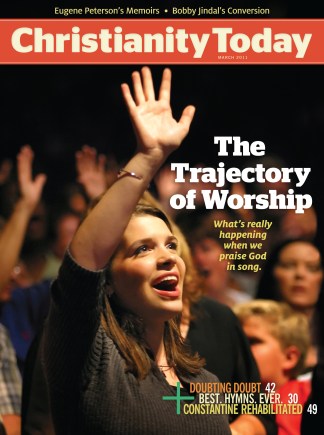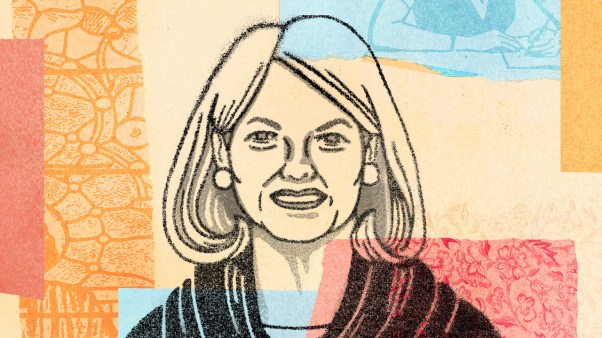When you think of some of the most passionate, persistent, and eloquent advocates for social change—William Wilberforce, Winston Churchill, Martin Luther King Jr.—you think of men who were confident in the rightness of their cause.
But a new study published in Psychological Science says that it's doubt, not confidence, that leads individuals to advance their beliefs and attempt to persuade others.
For their study, Northwestern University researchers David Gal and Derek Rucker asked students to write out their views on animal testing. Yet only half of the students were allowed to use their preferred hand. That's because earlier studies have shown that people have less confidence in what they are writing when using their weak hand. Then students were asked to write something persuasive with their preferred hand. The students who had been induced to lose confidence wrote significantly more words in an attempt to persuade others.
Other experiments were run dealing with vegetarianism and the ultimate proselytizing vehicle: Mac computers. In every case, doubt turned the students into stronger advocates, particularly if the belief was important to them.
The researchers said their work (which was based on earlier studies about enduring beliefs after failed religious prophecies) offers a warning to anyone on the receiving end of an advocacy attempt.
"Although it is natural to assume that a persistent and enthusiastic advocate of a belief is brimming with confidence, the advocacy might in fact signal that the individual is boiling over with doubt," they concluded.
Who doesn't want to think this is true, especially after a quick read of the latest screed from a New Atheist or, for that matter, enduring an overwritten post on an apologetics blog? It's not news that people reject information that clashes with their beliefs, or that people, ourselves included, can get loud and verbose when challenged. Sometimes lengthy arguments are more about convincing ourselves than about convincing others.
But it's also true that people may argue vehemently simply because they are trying to convince others of the rightness of an important cause. A lengthy argument might indicate doubt, but it might also mean that beliefs are complex, counterintuitive, or brushing up against long-held errors.
While the researchers argue that enthusiastic evangelism indicates a lack of confidence, others say that doubt is precisely what Christians should embrace.
'Take away assertion, and you take away Christianity.' —Martin Luther
"The opposite of faith isn't doubt—it's certainty," wrote Pastor Peter Marty in the August 2010 issue of the Evangelical Lutheran Church in America's magazine, The Lutheran. Equating certainty with self-righteousness and arrogance, Marty encouraged everyone to open their minds. "Doubt is really quite beautiful. For too long we have been denying doubt the respect it deserves."
That would have been news to Martin Luther, who also disliked self-righteousness. In his Preface to Romans, he wrote, "Faith is a living, unshakeable confidence in God's grace." In a 1525 debate with Erasmus, who praised doubt and accused Luther of seeking certainty, he said, "To take no pleasure in assertions is not the mark of a Christian heart; indeed, one must delight in assertions to be a Christian at all …. Take away assertion, and you take away Christianity." Luther pointed to the words of Paul, who so often called for "full assurance," or the highest degree of certainty and conviction.
"The Holy Spirit is no skeptic, and the things he has written in our hearts are not doubts or opinions, but assertions—surer and more certain than sense and life itself," Luther said.
Does that mean that with the knowledge of the life, death, and resurrection of Christ, we won't face doubts? Hardly. Scripture is full of stories of people, from Eve to Thomas, who doubted the promises of God. But just because it's human to doubt and we all do it does not mean it should be celebrated so much as endured.
Shortly after the Transfiguration, in which Jesus shone with the glory of his divine nature, he came upon an anxious father. When the father asked Jesus to deliver his son from demonic possession, Jesus told him, "All things are possible for one who believes." The father responded, "I believe; help my unbelief!" Jesus cast out the demon. What a beautiful reminder of how Jesus delivers us from a world of despair and doubt.
Copyright © 2011 Christianity Today. Click for reprint information.
Related Elsewhere:
Previous Throwing Inkwells installments include:
Flunking Pew's Pop Quiz | Good thing the Last Judgment is not a round of Final Jeopardy! (January 7, 2011)
The Parent of All Virtues | Gratitude is also the one we are most likely to sabotage. (November 22, 2010)
In Over His Pay Grade | When science is made 'apolitical' and 'unencumbered by religion,' it's usually to hyper-politicize and hyper-sacralize it.(March 23, 2009)
Previous articles about doubt from Christianity Today include:
Nancy Pearcey: How to Respond to Doubt | The most effective way to prevent teens from leaving the faith is to openly discuss the reasons they want to. (December 21, 2010)
My Top 5 Books on Doubt | Picks from John Ortberg, author of 'Faith and Doubt.' (April 29, 2010)
The Benefit of the Doubt | The disciple Thomas reveals an important truth about faith. (April 3, 2000)










